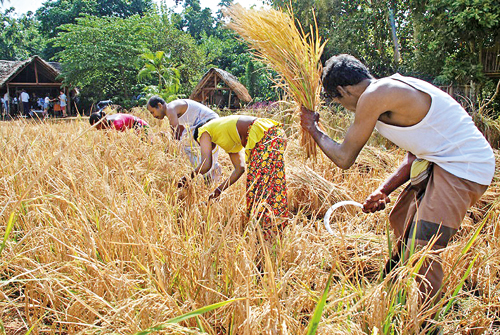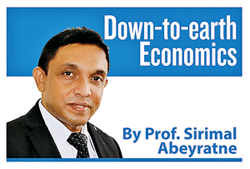Learning and unlearning from the crisis
View(s):
Farming is heavily subsidised.
There is one critical lesson that Sri Lankans can learn from its economic crisis. By experience, however, I know that “learning” is not an easy thing to do particularly after we leave our childhood, because it requires also “unlearning” what we have already learnt in the past. Apparently, unlearning is much more difficult than learning. It requires a greater degree of humility and ability to work against one’s ego.
Today, I thought of connecting some of the economic matters which we have adored and preserved, although they shaped the roots of the current economic mess, we are in. My list is long, but I will pick up a few common issues.
Spend more
The first problem I want to emphasise is our deception over the government’s ability to spend for us. Throughout our history, we usually anticipated at every budget speech the government’s lavish expenditure on consumer subsidies, free education, free healthcare and even salary hikes. If any rational government genuinely wanted to make some logical corrections and put things in order, such governments did not survive. As a result, people wanted to elect the leaders who promised to give more so that they too compete with each other to promise more.
The problem is that the government too should have resources primarily coming from taxes to spend more. Sri Lanka does not have a better taxation system. As a result, a fewer number of people pay taxes, while millions evade paying taxes because of poor tax administration. And some of the taxpayers managed to get themselves exempted from paying taxes for various reasons. The question is how do we maintain the government’s ability to spend high without paying taxes high?
Today, we expect to improve our “social market economy” – the term coined with the German economic regime. We must remember that Germany has government revenue closer to 30 per cent of GDP. How do we establish a social market economy by maintaining government revenue at 12 per cent of GDP?
When we elect the politicians to spend more for us without asking us to pay more taxes, then obviously such spending should come with borrowings from domestic and foreign sources and money printing. And that is the end of the journey.
Government jobs
Apparently, it is the government’s responsibility to establish a better policy and regulatory system that would attract more and more investments, while those investments would create more jobs and generate more incomes for the country. Instead of doing that, since the early 1970s politicians have undertaken the job of giving jobs to people. And people too started believing that it is the politicians who have the divine ability to give them a job.
 Politicians who promise more jobs in their electorate or district, apparently get more votes and get elected to form a government. Public sector employment statistics show that Sri Lanka had about one million public sector employees in the early 2000s; this has increased to 1.5 million (in net terms as there were retiring employees too). Even the increase in Sri Lanka’s total labour force during this period was much smaller than the increase in public sector employment.
Politicians who promise more jobs in their electorate or district, apparently get more votes and get elected to form a government. Public sector employment statistics show that Sri Lanka had about one million public sector employees in the early 2000s; this has increased to 1.5 million (in net terms as there were retiring employees too). Even the increase in Sri Lanka’s total labour force during this period was much smaller than the increase in public sector employment.
Now the government should pay their salaries and all other allowances as well as lifetime pensions and retirement benefits. How did we find the money needed for financing the increase in public sector employment over the years and decades? If the government did not ask us to pay more taxes, obviously it came from borrowing or printing money.
Reducing prices
Politicians often promise to reduce the prices of the commodities and utilities that the government provides such as fuel, gas, electricity, and transport, as well as the commodities in the market such as rice, onions, sugar, egg and chilli. People also believed that the politicians have extraordinary powers to do so and, voted for them.
By the way, we must also understand that by providing jobs to people and filling the public sector institutions and state-owned enterprises (SOEs) with more employees, the governments have already caused inefficiencies in such institutions and SOEs. Even with such internal inefficiencies, these institutions and SOEs continued to survive because there is no competition for them.
On the top of politically-instigated inefficiencies, the politicians now promised to reduce the prices, which is impossible! But we believe that impossibility, when we receive government’s supplies at lower prices which were made possible only by absorbing the losses by the government budget and financed through borrowings and money printing.
In addition to the government’s own supplies, the government also administers prices of goods and services in the market. We were deceived when the politicians come and say that they were going to reduce prices, which can be done either by absorbing the loss to government budget or by killing the competition and eliminating quality products.
Promoting agriculture
Another misconception that has often received priority is agriculture development. It has been backed by politically loaded statements such as “it’s the backbone of our economy” which is not true. Therefore, successive governments have continued to promote agriculture by providing fertiliser subsidies, purchasing the harvest, supplying free inputs, and exempting from taxes. While all these activities added cost to the government budget, it continued to depend on increased borrowings and money printing.
Let me compare an average
Sri Lankan farmer’s status with those farmers in some other small countries. Average agriculture value added generated by an Israeli farmer is US$13,000 a month, a Dutch farmer is $6,500 a month, compared with that of a
Sri Lankan farmer who received all the above government support, at less than $290 a month.
This comparison can reveal why Sri Lankan farmers are poor, while those farmers elsewhere such as in Israel and Holland are rich. In fact, I just need to remind that over 90 per cent of our poor people live in the rural agriculture sector!
The most fundamental issue here is that 2.2 million people – a quarter of our labour force, is trapped in our rural agriculture sector, without having an “open exit” to more urbanised industry and service sectors. In Israel, there are only 40,000 farmers, and in Holland 200,000 farmers. In order to have industrial and service sector development in urban centres, there should more investments; and we are back to our investment promotion policy, which only very few politicians talk about. How can we make
Sri Lanka an attractive investment destination? How did other countries including our neighbouring countries in Asia do that?
On slippery path
Of course, when we try to make corrections now, it hurts us as never before for two reasons: The first is that we make corrections in the midst of a crisis, pushing us from the pan to the fire. The second is that we make corrections “at once” having no room for adopting a gradual progressive path, although we have made a gradual regressive path towards the crisis. Due to both factors, corrections are painful and politically fragile too.
The Sri Lankan economy is on the path of recovery, although much more things need to be done in the coming years than what we did in the recent past. But it does not rule out the possibility of falling back and falling down to a deeper economic crisis. We are still on a slippery path. It is a choice that the Sri Lankans, not anyone else, have to make.
We have been attempting to keep government finance in order and to limit borrowings and money printing. These measures are basically aimed at achieving “economic stability” while stability does not survive for long without economic growth and export growth.
(The writer is a Professor of Economics at the University of Colombo and can be reached at sirimal@econ.cmb.ac.lk and follow on Twitter @SirimalAshoka).
Hitad.lk has you covered with quality used or brand new cars for sale that are budget friendly yet reliable! Now is the time to sell your old ride for something more attractive to today's modern automotive market demands. Browse through our selection of affordable options now on Hitad.lk before deciding on what will work best for you!


